13 Surprising Benefits Of Moringa Leaves And Side Effects
You do not have to go too far to replenish your iron and healthy lipid levels.
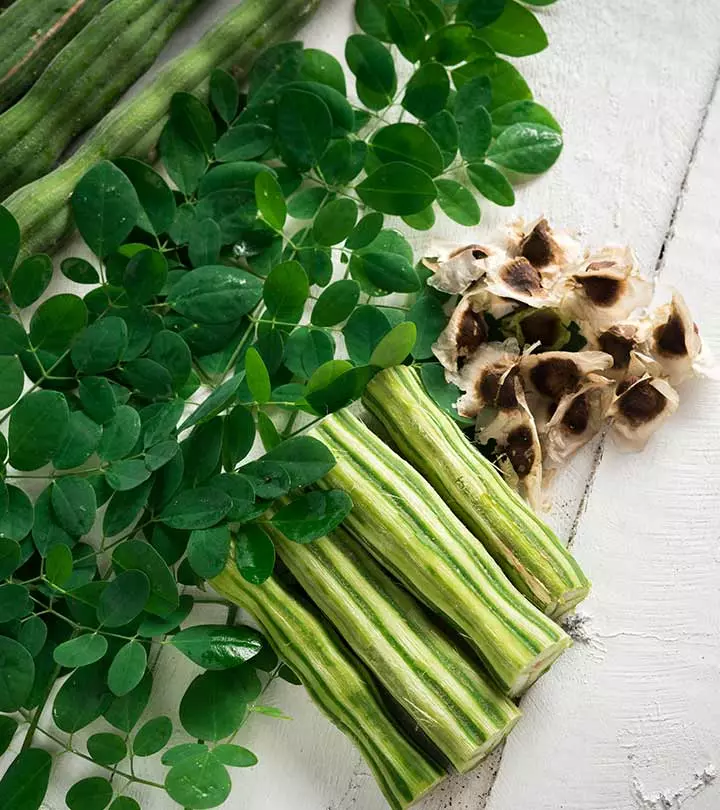
Image: Shutterstock
Moringa leaves’ benefits are numerous. In African and Asian medicine, they are used to manage liver disorders, obesity, asthma, sexual dysfunction, and arthritis. This is because their phytochemicali Chemicals found and produced in plants that help them fight harmful microorganisms and predators. and protein content is very high. They are considered a substitute for animal protein and have been used in traditional medicine for millennia (1).

Keep reading to learn more about moringa leaves, the array of benefits they offer, and how to use them for treatment. Scroll down to know more!
 Know Your Ingredient: Moringa leaves
Know Your Ingredient: Moringa leavesWhat Is It?
It is the appendage of a fast-growing, drought-resistant tree stem.
What Are Its Benefits?
Boosts hemoglobin and iron, reduces cholesterol, may help treat inflammation, increase sexual performance, prevent weight gain, and protect the liver.
Who Can Use It?
It is safe to be consumed by all but is especially recommended for people with bloating, gas, and other digestive issues.
How Often?
You can consume the leaves or moringa tea twice a day.
Caution
Consult your doctor before consuming any of the leaves, even if there is no data available on any side effects of moringa leaf .
In This Article
Moringa Leaves: In Detail
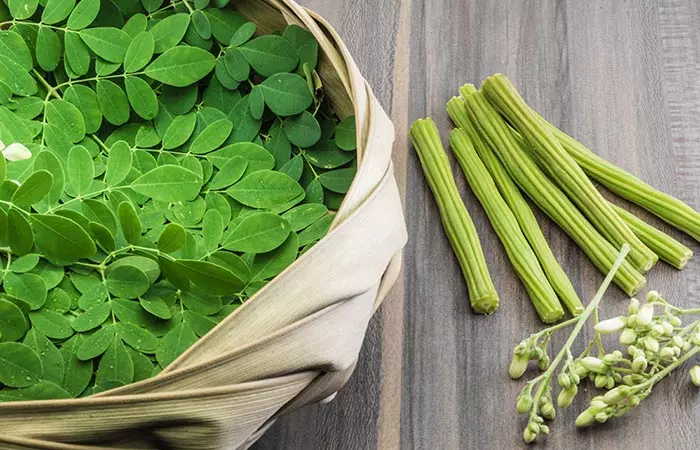
Moringa is also known as ‘drumstick’ or ‘horseradish’ or ‘malunggay.’ It (Moringa oleifera) is a tropical tree and is cultivated and consumed in parts of Asia and Africa.
Interestingly, this plant is a distant relative of broccoli, cabbage, and kale. It also has a similar nutritional profile. The leaves of the moringa plant have a high medicinal value (2).
Moringa leaves are great sources of protein. They contain all the essential amino acids. These leaves are rich in nutrition with potassium, calcium, phosphorus, iron, vitamins A, D, C, and β-carotene (1), (3).
The moringa tree is also called the ‘Miracle Tree,’ ‘God’s Gift To Man’, and ‘Savior of the Poor’ because it has been used to treat malnutrition and various other disorders (2).
Moringa leaves help deal with cardiovascular diseases,blood sugar, and inflammatory disorders (3). The following section has a detailed account of moringa benefits for health. Take a look!
Key Takeaways
- Moringa leaves are excellent for general health because they are full of vitamins, minerals, and antioxidants.
- They can enhance digestion, strengthen the immune system, and even lessen bodily inflammation.
- Moringa leaves also have antibacterial and antifungal qualities that can prevent infection.
- You may need to modify your skincare routine after using moringa leaves because they can protect against environmental damage, minimize acne and dark spots, and help the texture.
13 Benefits Of Having Moringa Leaves
Thanks to their high antioxidant content, moringa leaves can prevent lipid peroxidation and liver disorders. They also boost hemoglobin content and breast milk yield.
1. Boost Hemoglobin And Iron Levels
A cup of chopped moringa leaves has about 0.84 mg of iron, 8 mcg of folate, and 1588 IU of vitamin A (4). Consuming these nutritious leaves may be beneficial for pregnant women and women dealing with anemia.
Rat studies show that moringa leaves show a positive effect on blood parameters. These include platelet count, hemoglobin levels, packed cell volume (red blood cell volume), maternal anemia, etc.
Optimal levels of iron and hemoglobin in women prevent complications during pregnancy and delivery, including low birth weight (5), (6).
Moreover, iron absorption is vitamin A-dependent. Since moringa leaves are good sources of vitamin A, they also boost the rate of iron retention. Hence, you will not face rapid iron reserve depletion in your body (7).
2. Normalize Lipid Profile
Alterations
in the levels and composition of lipids in your blood can lead to dyslipidemia. Dyslipidemiai A medical condition caused by an imbalance of fat molecules, including cholesterol, in the blood. could be congenital (by birth) or a result of an unhealthy lifestyle (1).
An imbalance in your lipid profile is linked to atherosclerosisi A medical condition where plaque builds up inside artery walls resulting in clogged arteries and hindered blood flow. , diabetes, and obesity. There are many plant-based remedies to manage dyslipidemia and other lipid disorders.
Animal studies report lipid-lowering properties in moringa leaves (1). Moringa leaf extracts brought down total cholesterol levels in animals on a high-fat diet. In rat studies, the treated animals showed a 14% reduction in total cholesterol levels as compared to a 30% increase in the levels in animals left untreated.
Moringa leaves also increase the levels of good cholesterol (HDL) and balance your lipid profile (1).
3. May Work As A Natural Protein Supplement
Moringa leaves have high levels of protein with all the essential amino acids. Hence, they can supplement animal protein in your diet (8), (9).
Dried moringa leaves have higher levels of leucine, isoleucine, threonine, tyrosine, methionine, phenylalanine, lysine, and histidine. Alanine and leucine are the most abundant, while cysteine and methionine are present in the lowest concentrations (8).
Including these leaves in your diet is a good idea because a high-amino acid diet boosts your immunity. These nutrients protect your GI tract from parasites and microbial infections. The leaves help in replenishing your body’s lost protein content after pathogenic attacks (8).
4. May Treat Inflammatory Diseases

The drumstick leaves are used in African folk medicine to treat pain and rheumatism. Scientists postulate that the bioactive ingredientsi Naturally occurring chemicals in food and plants that regulate biological activities and promote good health. of these leaves play a crucial role in managing pain and inflammation (10), (11). It may also help to treat inflamed skin.
Their extract inhibits the secretion of pro-inflammatory compounds. It also keeps nitric oxide (NO), prostaglandins, cellular messengers (cytokines), and several other components of the immune system under check (12).
With potent anti-inflammatory and anti-nociceptive properties, moringa leaves can relieve several acute/chronic inflammatory disorders to an extent. Studies report the best recovery in the cases of rheumatoid arthritis, edemai Fluid build-up inside the body, commonly affecting feet and ankles, resulting in swelling. , ulcers, colitisi A medical condition where the lining of the colon, or the large intestine, becomes inflamed and swollen. , irritable bowel disease, and asthma (13).
5. May Support Mental Health
Moringa leaves contain flavonoids and phenols, which are vital antioxidants and have neuroprotective and anti-inflammatory properties. Research suggests they may help support your mental health by treating depression linked to brain inflammation and chemical imbalances (14).
5. May Increase Sexual Performance
Various herbal extracts have been used as aphrodisiacs. They improve sexual performance and desire. Some of them can also correct erectile and sexual dysfunction caused due to stress (15).
Moringa leaf extracts have similar properties. They inhibit the hydroxylation of testosterone, thus enhancing sexual potential. Their antioxidant capacity reduces the depletion of testosterone-producing Leydig cells (15).
As a part of clinical trials, rats were subjected to oxidative stressi An imbalance between reactive oxygen molecules and antioxidants in the body that may damage tissues and cells. . They were then treated with moringa leaf extracts to study these effects. The experiments show the treated rats to have higher levels of spermatozoa (15).
They also exhibit dopaminergic (dopamine-stimulating) action on your brain. Dopamine and testosterone together enhance sexual desire, penile blood flow (vasodilation), and erection in males (15).
6. Can Prevent Weight Gain
Moringa leaves contain abundant isothiocyanates, which are a class of bioactive ingredients. These help in the reduction of body weight and metabolic disorders like type 2 diabetes (16).
Rats fed on these leaves put on 18% less weight compared to their untreated counterparts. Moringa isothiocyanates stimulate lipolysis in adipose tissues. They trigger the breakdown of accumulated fat in the body to yield free fatty acids and triglycerides (16).
These active molecules operate at a molecular level. They interfere with the expression of genes involved in weight gain/lipid accumulation pathways. Hence, having moringa leaves may lower obesity and cut the risk of organ damage induced by lipid accumulation (16).
7. Can Enhance Breast Milk Yield

Another benefit of this miracle herb is enhancing the breast milk yield (galactagogue). Moringa capsules have been prescribed to nursing mothers to promote breastfeeding (17), (18).
A study performed on postpartum mothers demonstrated the positive effect of moringa leaf capsules. Those taking these capsules had higher prolactin levels. Their newborns too were comparatively heavier (18).
Lactation significantly improved in women who took moringa capsules for about two months. It is a common practice in the Philippines to use malunggay leaves to augment breast milk production (17), (18).
8. Can Protect Your Liver

Moringa leaves have been extensively studied for their antioxidants and anti-inflammatory properties. Chemical studies identified the presence of quercetin, gallic acid, chlorogenic acid, glucosinolates, tannins, and saponins in them (19).
Molecules like quercetin have substantial effects on liver health and might help in detoxification. It may help with your digestion as well. They reduce the levels of hepatic enzymes, which include aminotransferase (AST), alanine aminotransferase (ALT), creatinine, and alkaline phosphatase (ALP). As a result, your liver and kidneys stay protected from drug- and inflammation-induced injury (19).
In guinea pigs, moringa leaf extract could prevent non-alcoholic fatty liver disease (NAFLD) by reducing the lipid content in their livers. The extract could also control the expression of genes involved in the uptake of hepatic lipids (19).
9. Possess Antioxidant Effects
Moringa leaf extracts scavenge the stress-causing free radicals from your body. They are known for their antioxidant properties. Terpenoids, saponins, tannins, and flavonoids are the common phytochemicals found in them (19).
Phenolic compounds are the primary antioxidants. They inactivate free radicalsi Reactive oxygen molecules that can react adversely with other healthy cells and cause damage or illness. , prevent decomposition of complex molecules into free radicals, and neutralize the existing free radicals (19).
It is because of this property that moringa leaves help manage chronic disorders like diabetes, hypertension, Alzheimer’s, Parkinson’s, and aids in cancer prevention (19).
10. May Enhance Eye Health
Moringa leaves are rich in vitamin A that may help prevent several eye problems, including night blindness. They may also help delay the development of cataracts (19).
11. May Treat Asthma
Animal studies support moringa’s anti-asthmatic effects in reducing airway inflammation and bronchospasm (20). Another study published in the Indian Journal Of Pharmacology found that moringa seed kernels may help treat bronchial asthma and reduce the severity of asthmatic attacks (21).
12. May Treat Kidney Stones
Moringa leaves exhibit antiurolithiatic activity that may inhibit the crystallization of calcium oxalate. This way, they may play an important role in kidney stone treatment (22), (23).
Mind-blowing Moringa!
Moringa has another ability – it purifies water (24).
River water can contain harmful particles, bacteria, and microorganisms. Not all places can have a water purifier. But having a moringa plant close to a water body can ensure good water quality.
You can add crushed moringa seeds to vats of water to get rid of harmful particles. The particulate matter settles down with the seed bits at the bottom of the water body.
An hour of this treatment should give you clean water, which can be collected from the top vats.
Let us take a look at the nutritional and phytochemical details of moringa leaves. These components are the driving force behind the above-discussed therapeutic applications. Scroll on!
Phytonutrition of Moringa Leaves
| Nutrient | Unit | 1 cup, chopped or 21 g |
|---|---|---|
| Water | g | 16.52 |
| Energy | kcal | 13 |
| Energy | kJ | 56 |
| Protein | g | 1.97 |
| Total lipid (fat) | g | 0.29 |
| Ash | g | 0.47 |
| Carbohydrate, by difference | g | 1.74 |
| Fiber, total dietary | g | 0.4 |
| Minerals | ||
| Calcium, Ca | mg | 39 |
| Iron, Fe | mg | 0.84 |
| Magnesium, Mg | mg | 9 |
| Phosphorus, P | mg | 24 |
| Potassium, K | mg | 71 |
| Sodium, Na | mg | 2 |
| Zinc, Zn | mg | 0.13 |
| Copper, Cu | mg | 0.022 |
| Manganese, Mn | mg | 0.223 |
| Selenium, Se | µg | 0.2 |
| Vitamins | ||
| Vitamin C, total ascorbic acid | mg | 10.9 |
| Thiamin | mg | 0.054 |
| Riboflavin | mg | 0.139 |
| Niacin | mg | 0.466 |
| Pantothenic acid | mg | 0.026 |
| Vitamin B-6 | mg | 0.252 |
| Folate, total | µg | 8 |
| Folate, food | µg | 8 |
| Folate, DFE | µg | 8 |
| Vitamin A, RAE | µg | 79 |
| Vitamin A, IU | IU | 1588 |
| Amino Acids | ||
| Tryptophan | g | 0.03 |
| Threonine | g | 0.086 |
| Isoleucine | g | 0.095 |
| Leucine | g | 0.166 |
| Lysine | g | 0.113 |
| Methionine | g | 0.026 |
| Cystine | g | 0.029 |
| Phenylalanine | g | 0.102 |
| Tyrosine | g | 0.073 |
| Valine | g | 0.128 |
| Arginine | g | 0.112 |
| Histidine | g | 0.041 |
| Alanine | g | 0.148 |
| Aspartic acid | g | 0.193 |
| Glutamic acid | g | 0.217 |
| Glycine | g | 0.109 |
| Proline | g | 0.095 |
| Serine | g | 0.087 |
| Other | ||
| Isorhamnetin | mg | 0.1 |
| Kaempferol | mg | 1.2 |
| Quercetin | mg | 3.5 |
The leaves contain the highest amount of glucosinolates found in the moringa plant. They also contain potent flavonoidsi A group of chemical compounds found in plants, known for their antioxidant properties and medicinal health benefits. like quercetin, kaempferol, and isorhamnetin (25).
Carotenoidsi Yellow or red pigments found in plants that have medicinal properties and convert into vitamin A in the intestine. , such as luteolin, lutein, zeaxanthin, luteoxanthin, are recorded in the foliage, flowers, and seeds of this plant. These leaves are also good sources of vitamin E, omega-3 (ω-3), and omega-6 (ω-6) acids (PUFAs) (25).
 Quick Tip
Quick TipNow, the obvious concern would be: How should you take moringa leaves to make the most of their phytonutritional profile?
What Are The Different Ways To Take Moringa Leaves?
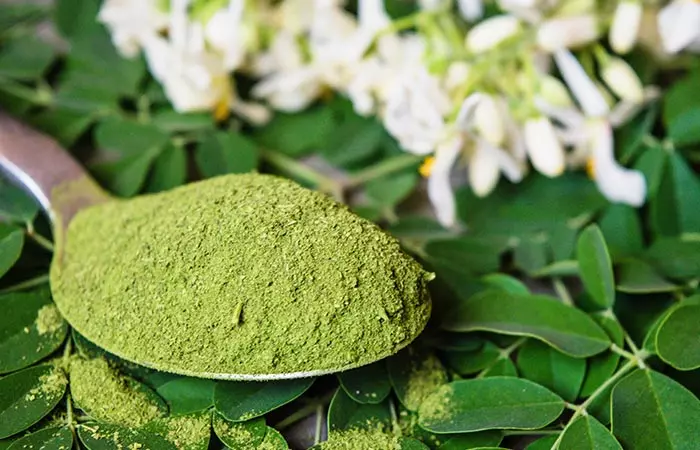
You can find moringa leaves in the market in various forms. The most preferred option is dried leaves. These are edible and have a horde of uses.
If you don’t like the feel of whole leaves, moringa leaf powder is an excellent option.
You can add a spoonful of the leaf powder to hot or cold water and drink it up. Brewing a cup of moringa tea is another fabulous idea.
A food blogger encouraged their readers to give homemade moringa tea a try as Moringa tea benefits are also noteworthy. They said, “I love the taste of a freshly prepared tea with a hint of lemon and honey, it is refreshing (i).”
You can also blend this leaf powder into smoothies, protein shakes, meal shakes, porridges, and soups.
The leaves can also be added to readymade or home-made salad dressing. Toss in the veggies as well, and you are sorted with the day’s protein requirement.
Add fresh and clean moringa leaves directly to the salad. They taste somewhat like arugula – bittersweet.
Suppose none of these options looks impressive to you. In that case, you can check out moringa capsules, which may ensure better nail growth and health and also deliver moringa benefits for hair, as you can notice visible improvement in hair texture and thicker strands.
With so many ways to use them, moringa leaves are on their way to become the next superfood!
 Quick Tip
Quick TipYou should make Moringa leaves a part of your diet. Many people also suggest taking its seeds as moringa seeds benefits for health is also very extensive. Before you get there, it is better to check for the potential risks and pitfalls. Read the next section for details.
What Are The Side Effects Of Moringa Leaves?
No adverse effects have been reported with using moringa leaves. Neither human nor animal studies have sufficient data to prove their toxicity (26).
Laboratory experiments on rats concluded that doses of up to 2000 mg/kg of moringa leaves were safe. A human study was conducted with whole leaf powder at a dose of 8 g per day for 40 days. No toxicity or side effects were observed in this study (27).
However, the leaves may interact with certain medications. Research suggests that moringa can interfere with how the body processes antiretroviral medicines like Nevitapine by affecting the enzymes that break them down. This may decrease the amount of the medicine in the bloodstream, making it less effective (27). Anecdotal evidence also suggests that the leaves may interact with anticoagulants. So, you should always consult your doctor before consuming them.
Infographic: How To Make Moringa Juice
Moringa leaves are a highly nutritious superfood. In addition, they have several health benefits, like improving hemoglobin levels and preventing weight gain and promoting health wellness. Thus, it is good to include moringa juice in your daily diet.
Check out the infographic below to learn how to prepare this delicious treat. Illustration: StyleCraze Design Team
Moringa leaves have been used in traditional medicine for their medicinal properties. These are nutrient-dense and are considered the best substitutes for animal protein. The benefits of moringa leaves are numerous and can be attributed to their high antioxidant content. Moringa leaves may improve hemoglobin levels, balance lipid profiles, relieve pain and inflammation, increase sexual performance, promote weight loss, and enhance breast milk production. Moringa leaves are also thought to have anti-aging effects due to vitamin C. You can add the leaf powder to your favorite smoothies, soups, protein, and milkshakes. As there is insufficient data available on the side effects of moringa leaves, it is advisable to check with your doctor before consumption.
Frequently Asked Questions
Can I boil moringa leaves and drink the water?
Yes. You can boil fresh and washed moringa leaves to make moringa tea and drink it. Moringa tea is beneficial for overall health.
Should I take moringa in the morning or at night?
You can consume moringa leaves or take moringa tea both in the morning and at night. However, if you are taking moringa capsules, you must take them with breakfast, as directed in the package instructions or as directed by your healthcare provider.
Can I drink moringa tea on an empty stomach?
It is recommended to take moringa tea with meals rather than on an empty stomach.
Can moringa cure urinary tract infections?
Moringa stem bark may help treat urinary tract infections (28). There is not enough evidence to conclude whether moringa leaves will have the same effect or not.
Does moringa tea raise blood pressure levels?
No, on the contrary, moringa leaves may help lower blood pressure levels.
Illustration: Surprising Benefits Of Moringa Leaves And Side Effects
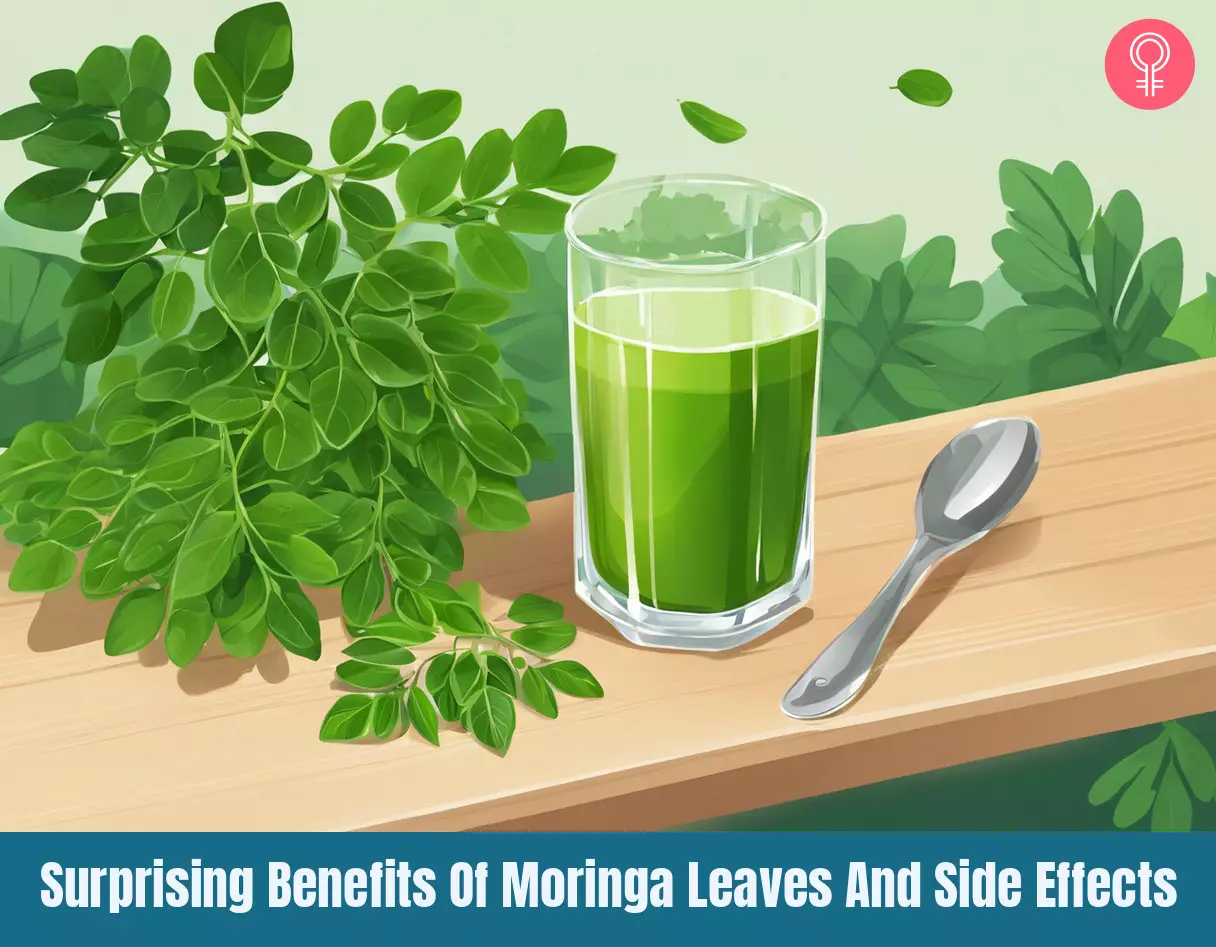
Image: Stable Diffusion/StyleCraze Design Team
Learn to prepare a delicious and nutritious vegetable soup using drumstick or moringa leaves. Unveil the incredible health benefits of this superfood while mastering the simple recipe discussed in the video below.
Personal Experience: Source
StyleCraze's articles are interwoven with authentic personal narratives that provide depth and resonance to our content. Below are the sources of the personal accounts referenced in this article.
1. Homemade Moringa Teahttps://nicetiesoflife.wordpress.com/2018/03/04/homemade-moringa-tea/
References
Articles on StyleCraze are backed by verified information from peer-reviewed and academic research papers, reputed organizations, research institutions, and medical associations to ensure accuracy and relevance. Read our editorial policy to learn more.
- “Therapeutic Potential of Moringa oleifera Leaves in Chronic Hyperglycemia and Dyslipidemia: A Review” Frontiers in Pharmacology, US National Library of Medicine, National Institutes of Health.
- “Moringa — the next superfood?” News, The Reagents of the University of California, University of California.
- “Therapeutic Potential of Moringa oleifera Leaves in Chronic Hyperglycemia and Dyslipidemia: A Review ” frontiers in pharmacology.
- “Drumstick leaves, raw” Food Data Central, National Nutrient Database for Standard Reference Legacy Release, Agricultural Research Service, United States Department of Agriculture.
- “The Effect of Moringa oleifera Leaves on Blood Parameters and Body Weights of Albino Rats and Rabbits ” Jordan Journal of Biological Sciences, University of Khartoum Repository, University of Khartoum.
- “Effect of Moringa Oleifera Leaf Extracts Supplementation in Preventing Maternal Anemia and Low-Birth-Weight” International Journal of Scientific and Research Publications, Academia.
- “Effect of Beta Carotene from Dehydrated Drumstick Leaf Powder on the Haematological Indices of Non-Pregnant Non-Lactating Young Women Aged18 – 25 Yrs (Preliminary Trials)” Research Article, International Journal of Pharmaceutical & Biological Archives.
- “Nutritional characterization of Moringa (Moringa oleifera Lam.) leaves” Full Length Research Paper, African Journal of Biotechnology, CiteSeerX, The Pennsylvania State University.
- “Leaf Protein and Mineral Content across the “Miracle Tree” Genus Moringa” PLoS One, US National Library of Medicine, National Institutes of Health.
- “[Contribution to the study of the anti-inflammatory activity of Moringa oleifera (moringaceae)].” Dakar Medical., US National Library of Medicine, National Institutes of Health.
- “Bioactive Extract from Moringa oleifera Inhibits the Pro-inflammatory Mediators in Lipopolysaccharide Stimulated Macrophages” Pharmacognosy Magazine, US National Library of Medicine, National Institutes of Health.
- “Anti-inflammatory effect of Moringa oleifera Lam. seeds on acetic acid-induced acute colitis in rats” Avicenna Journal of Phytomedicine, US National Library of Medicine, National Institutes of Health.
- “In vivo anti-arthritic and anti-nociceptive effects of ethanol extract of Moringa oleifera leaves on complete Freund’s adjuvant (CFA)-induced arthritis in rats” Integrative Medicine Research, Elsevier, US National Library of Medicine, National Institutes of Health.
- “Evaluation of the antidepressant activity of Moringa oleifera alone and in combination with fluoxetine” Journal of Ayurveda and Integrative Medicine, US National Library of Medicine, National Institutes of Health.
- “Moringa oleifera extract enhances sexual performance in stressed rats” Journal of Zhejiang University Science B, US National Library of Medicine, National Institutes of Health.
- “Isothiocyanate-rich Moringa oleifera extract reduces weight gain, insulin resistance and hepatic gluconeogenesis in mice” Author manuscript, HHS Public Access, US National Library of Medicine, National Institutes of Health.
- “A Review of Herbal and Pharmaceutical Galactagogues for Breast-Feeding” The Ochsner Journal, US National Library of Medicine, National Institutes of Health.
- “Moringa oleifera Moringa oleifera (Malunggay) as a Galactagogue for Breastfeeding Mothers: A Systematic Review and Meta-Analysis of Randomized Controlled Trials” The Philippines Journal of Pediatrics, Academia.
- “Bioactive Components in Moringa Oleifera Leaves Protect against Chronic Disease” Antioxidants, US National Library of Medicine, National Institutes of Health.
- “Phytochemical analysis and pharmacological evaluation of methanolic leaf extract of Moringa oleifera Lam. in ovalbumin induced allergic asthma” South African Journal of Botany, ScienceDirect
- “Antiasthmatic activity of Moringa oleifera Lam: A clinical study” Indian Journal of Pharmacology, US National Library of Medicine, National Institutes of Health.
- “Inhibition of crystallization of calcium oxalate monohydrate using leaves from different species of Moringa – Experimental and theoretical studies” Journal of Crystal Growth, ScienceDirect.
- “Evaluation of Antiurolithiatic activity of Moringa leaves by UV Spectroscopic Method” Scholarly Journal, Proquest.
- “Moringaoleifera: Nature is Most Nutritious and Multi-Purpose Tree” International Journal of Scientific and Research Publications, CiteSeerX, The Pennsylvania State University.
- “Phytochemicals of Moringa oleifera: a review of their nutritional, therapeutic and industrial significance” 3 Biotech, US National Library of Medicine, National Institutes of Health.
- “Review of the Safety and Efficacy of Moringa oleifera”, PHYTOTHERAPY RESEARCH, US National Library of Medicine, National Institutes of Health.
- “Effect of Moringa oleifera Lam. leaf powder on the pharmacokinetics of nevirapine in HIV-infected adults: a one sequence cross-over study” AIDS Research and Therapy, US National Library of Medicine, National Institutes of Health.
- “Clinical Efficacy of Moringa oleifera Lam. Stems Bark in Urinary Tract Infections” International Scholarly Research Notices, US National Library of Medicine, National Institutes of Health.
Read full bio of Ionut Ignat
Read full bio of Swathi Handoo
Read full bio of Ravi Teja Tadimalla
Read full bio of Aparna Mallampalli






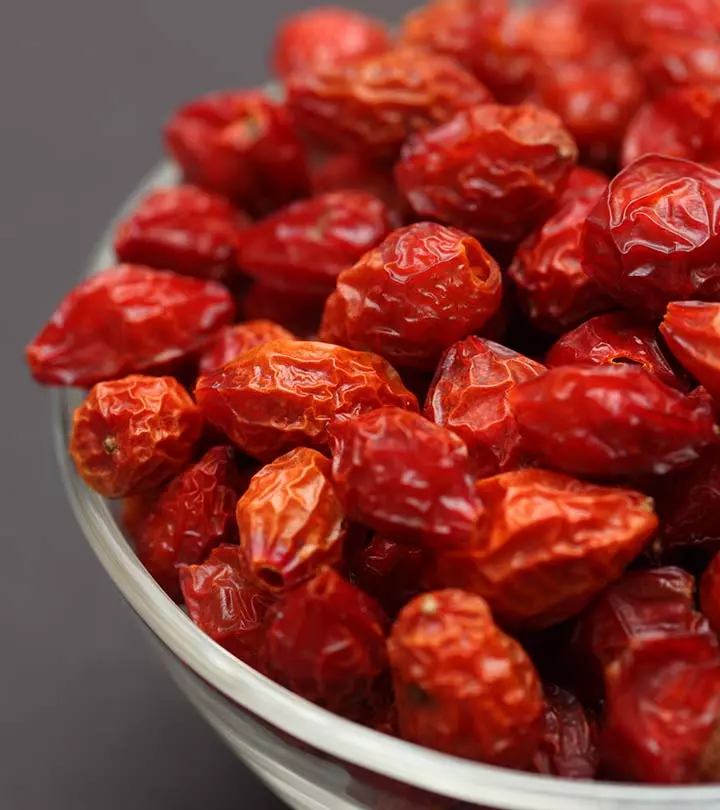


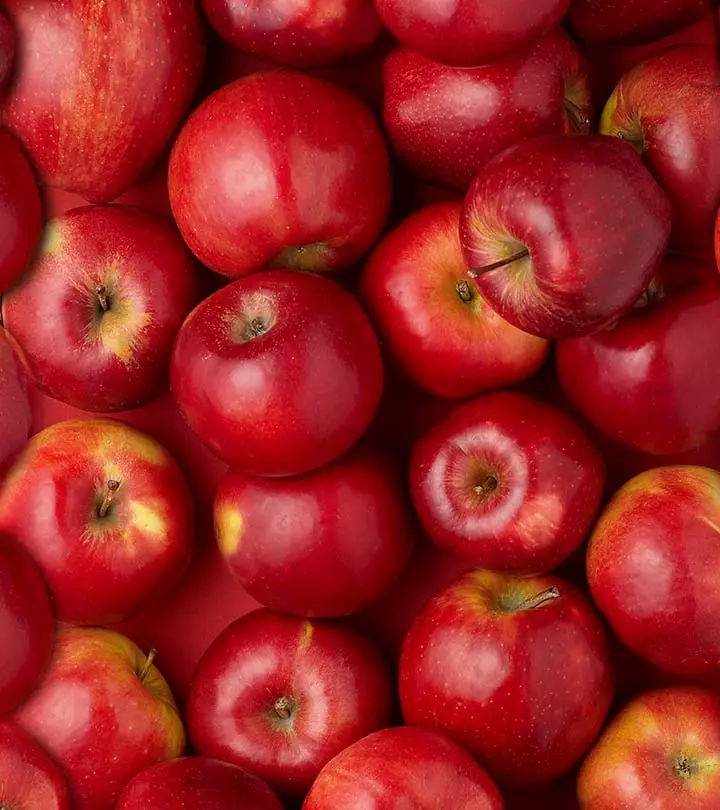
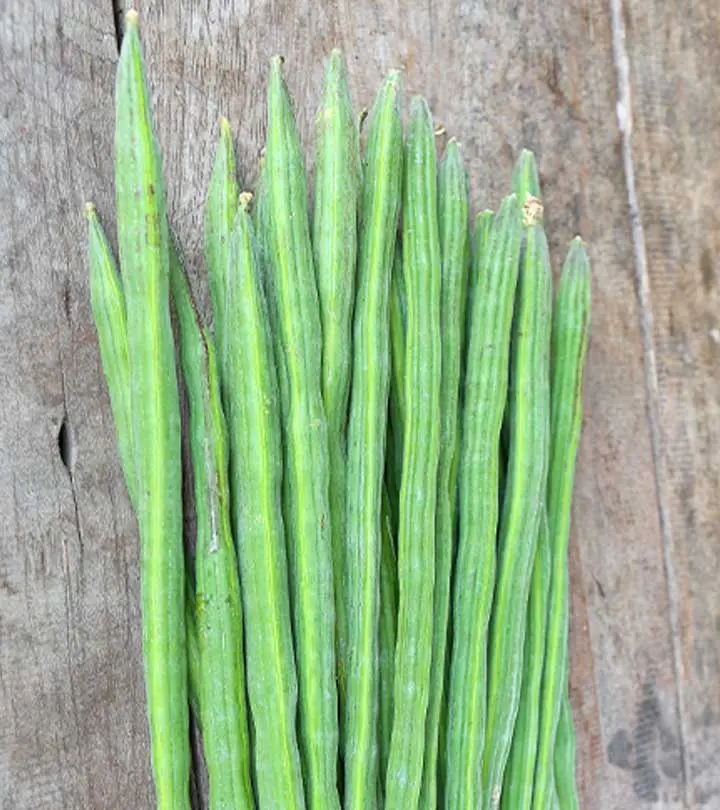
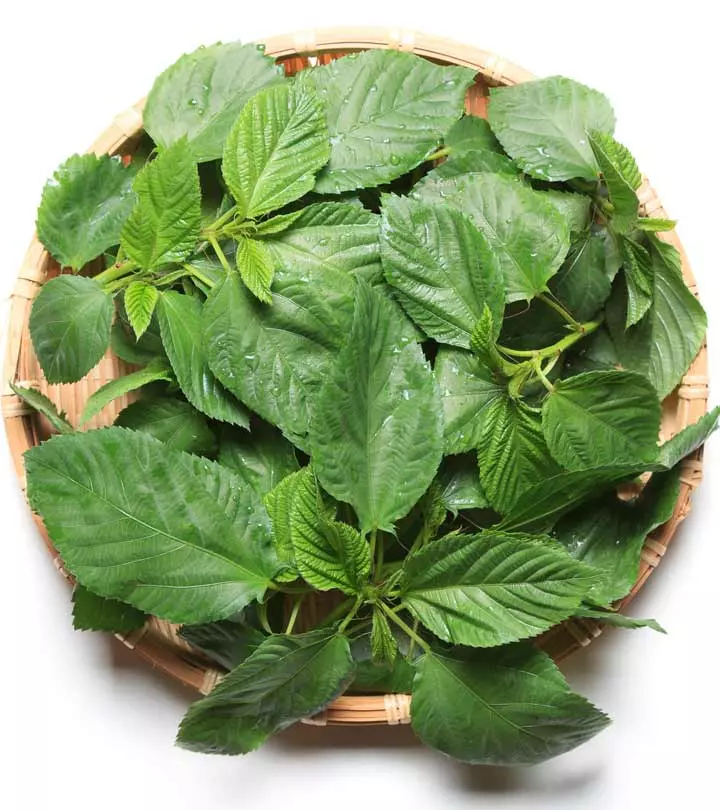
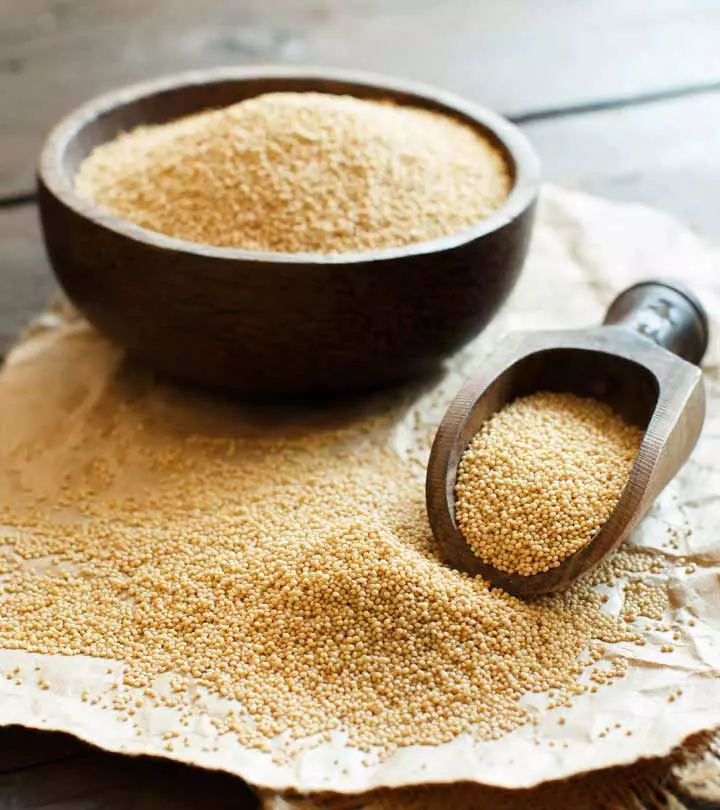
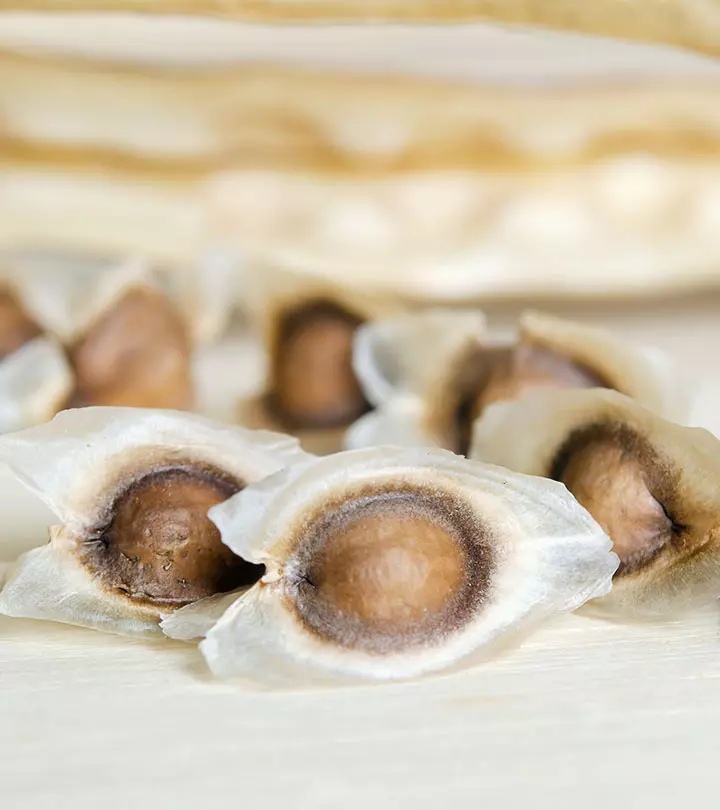
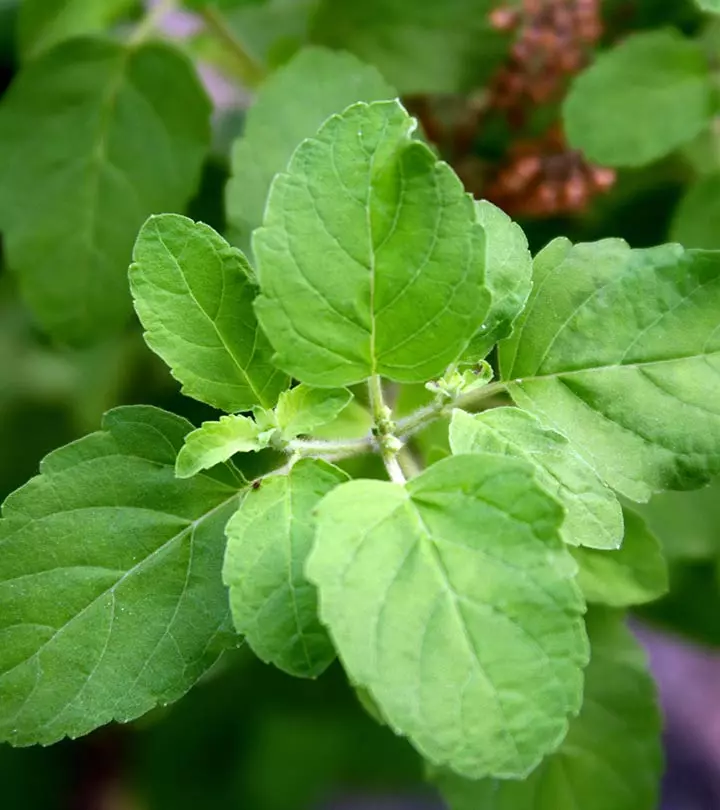
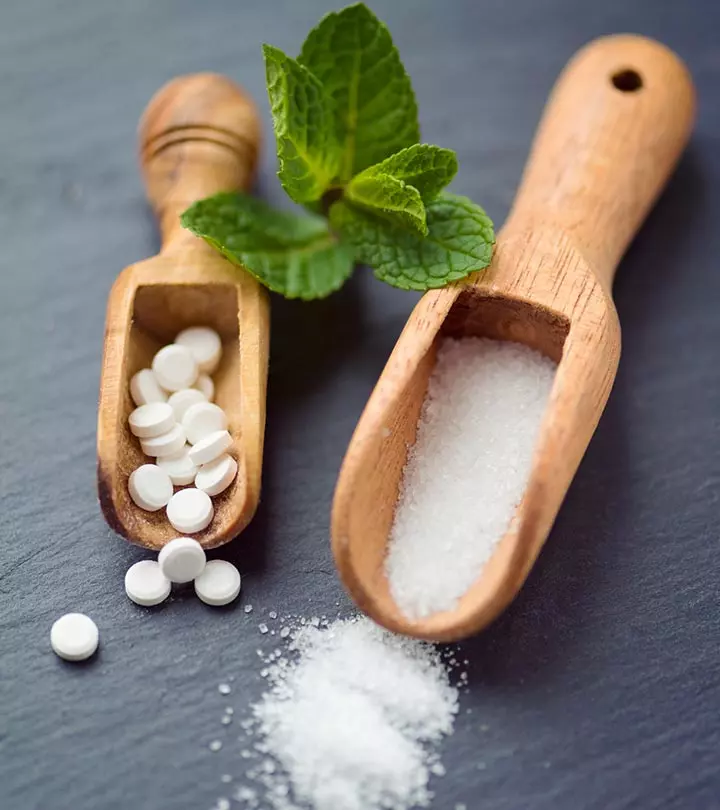
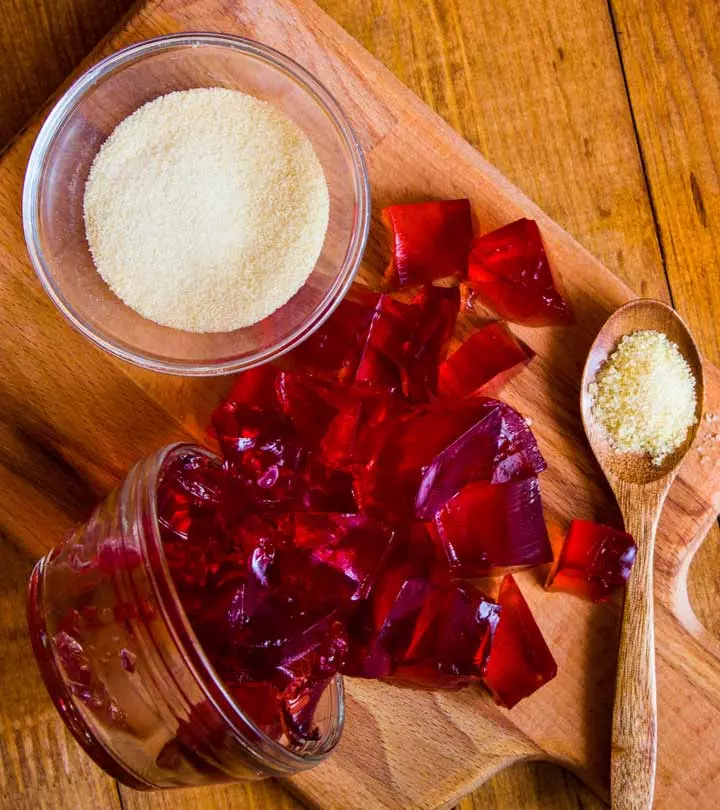
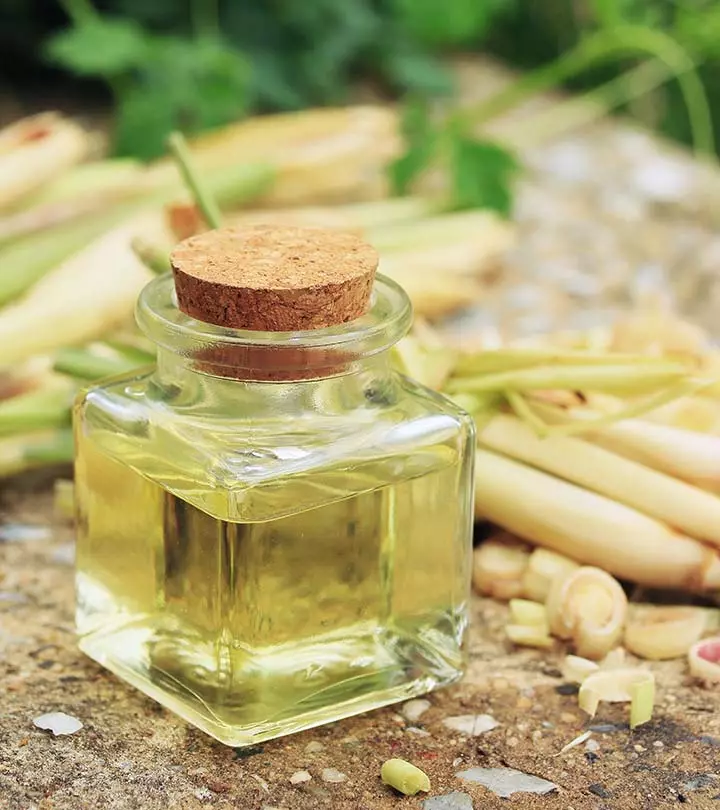
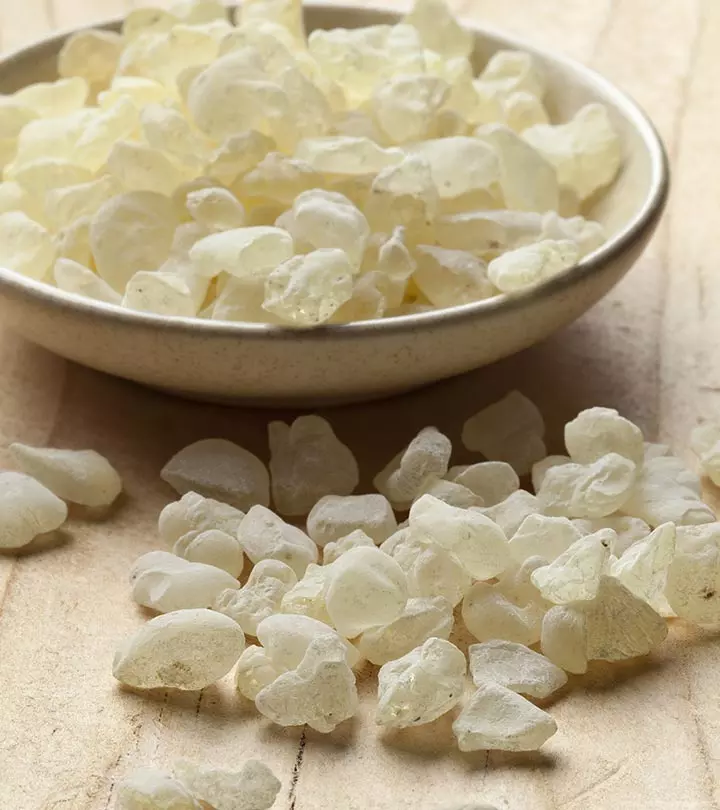

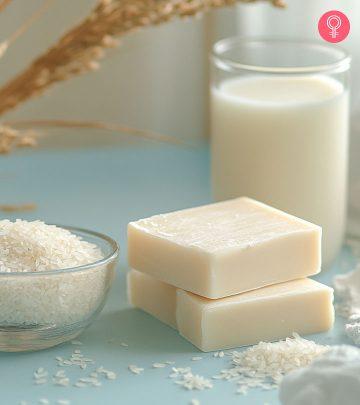
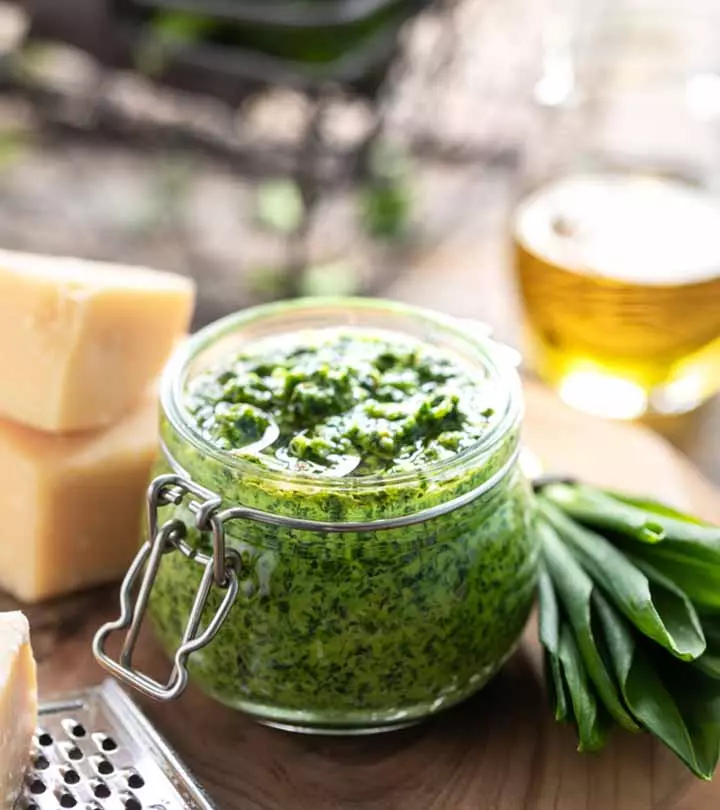
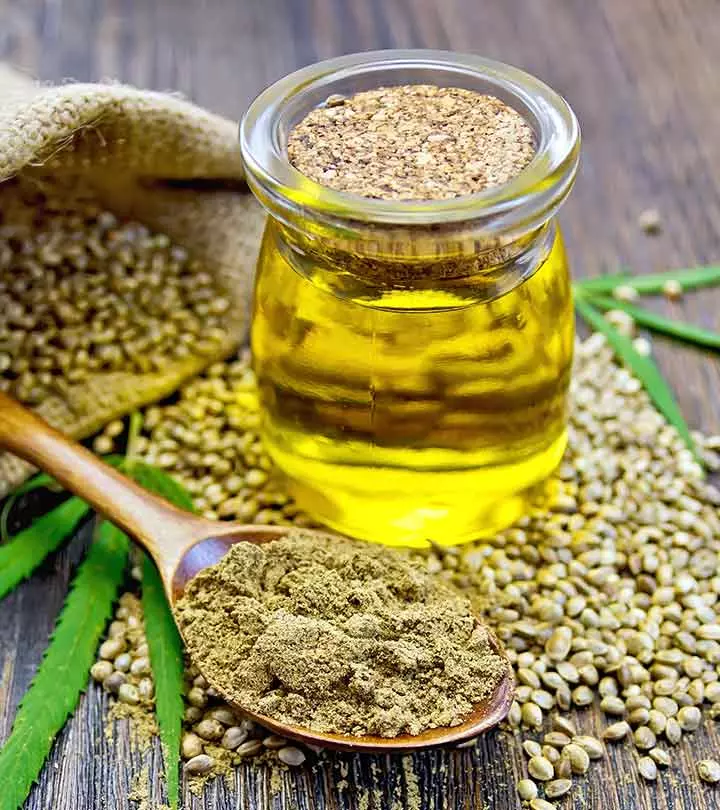
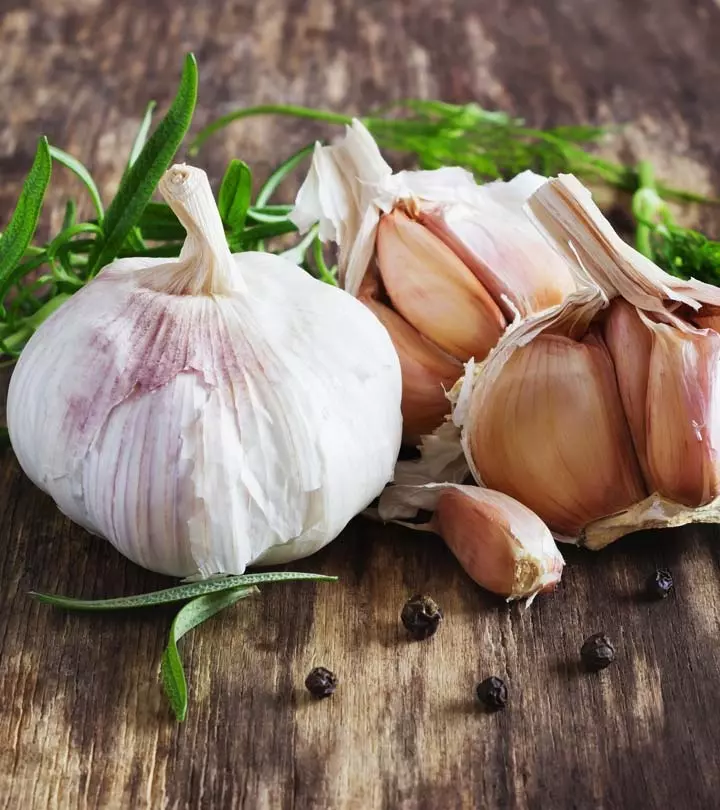
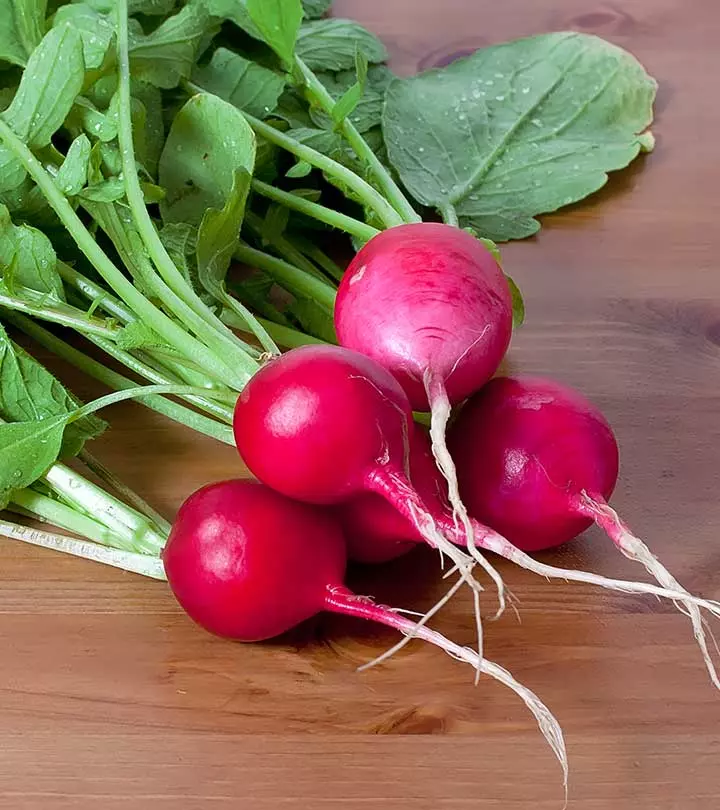
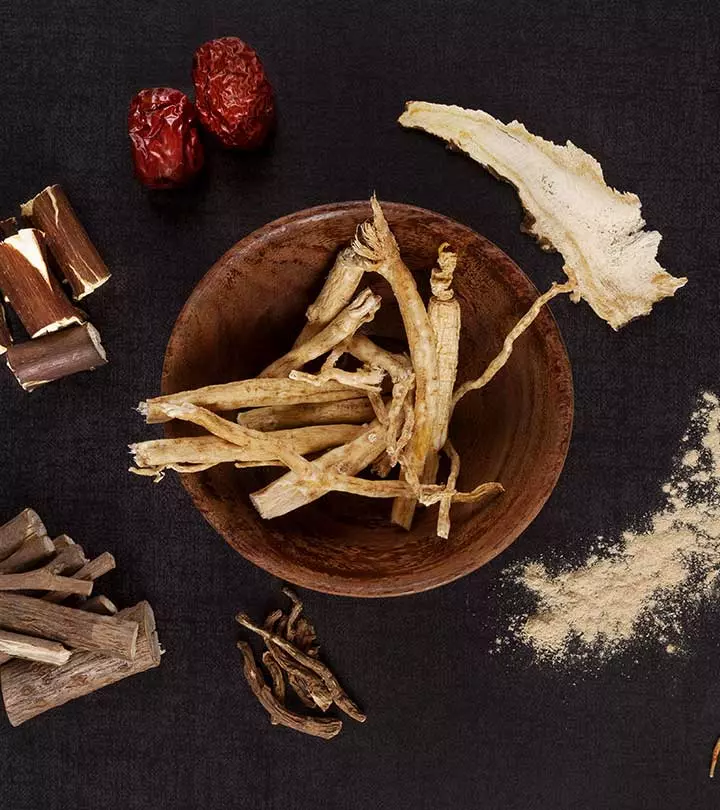
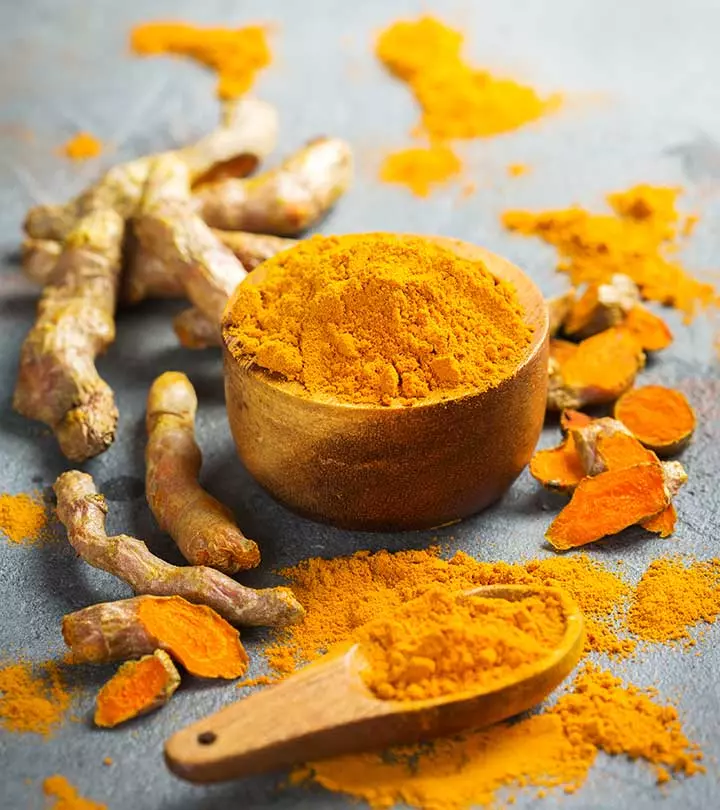
Community Experiences
Join the conversation and become a part of our empowering community! Share your stories, experiences, and insights to connect with other beauty, lifestyle, and health enthusiasts.